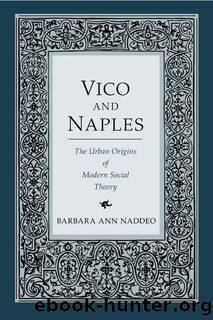Vico and Naples by Naddeo Barbara Ann.;

Author:Naddeo, Barbara Ann.;
Language: eng
Format: epub
ISBN: 978-0-8014-6135-4
Publisher: Lightning Source Inc. (Tier 3)
Vico’s History of Roman Jurisprudence and Exhortation of the Judiciary to Reform
Although Vico’s interest in the grand events of Rome was largely limited to the period of its monarchical rule, his interest in the legal institutions of Rome regarded a broader period in its history. Indeed, much of the third section of De uno was devoted to pinpointing the emergence and function of the different sources of the law during what is properly called the Roman Republic, namely, the Law of the Twelve Tables, the Senatus consulta, the leges of the Roman assemblies (or comitia), the plebiscites, and, most important for Vico, praetorian law.256 At the same time, Vico took an even keener interest in how those sources of law furthered the larger pattern of historical development he had sketched in his treatment of early Rome, that is, the history of the restitution of natural rights to the membership of the civic polity. Consequently, Vico focused his attention on the spirit of those institutions and their laws to underscore the role that they played in equalizing and enforcing the rights among the members of the Roman metropolis.
With his analysis, Vico first argued that the spirit of Roman law both instantiated and protected the interests of the polity’s dominant groups. Specifically, he showed that both law and jurisprudence were tools of the powerful, and that both changed with the modification of the hierarchy and power bases of the Roman orders. For Vico, the trajectories of Roman law and jurisprudence went hand in hand: they commenced with the “arcane jurisprudence” of the patriciate and the codification of the Twelve Tables, and they culminated in the “benevolent jurisprudence” of the emperor’s class of professional jurists and the ius civile of the Empire. Like so many of his categorical claims about the Roman world, this typology of jurisprudence too was original, and it too presumed that the raison d’être of these respective types was uniquely determined by the social upheavals of the civic community.
In what he called the respublica, for example, Vico reminded his reader that the power base of the Optimates greatly had been undercut by the census, which not only had redistributed land but also had destabilized the categories of “patrician” and “plebeian” by making wealth, as opposed to lineage, the basis for one’s classification within the polity and access to its magistracies.257 Consequently, this fluidity of the orders had spurred the so-called patricians by lineage to develop new strategies to maintain the exclusivity of their rank and its concomitant powers, strategies that Vico identified in their practice of usury,258 and, more centrally, in their jealous guarding of the laws and practice of an arcane jurisprudence.259 According to Vico, the jurisprudence of the patricians by lineage had derived from that of their ancestors, the Optimates, whose jurisprudence had been arcane, because it employed a recondite poetic language (based on similitude) to which they alone were privy,260 and rigorous, because it enforced the letter of the law.261 In the respublica democratica this arcane
Download
This site does not store any files on its server. We only index and link to content provided by other sites. Please contact the content providers to delete copyright contents if any and email us, we'll remove relevant links or contents immediately.
| Africa | Americas |
| Arctic & Antarctica | Asia |
| Australia & Oceania | Europe |
| Middle East | Russia |
| United States | World |
| Ancient Civilizations | Military |
| Historical Study & Educational Resources |
Room 212 by Kate Stewart(4107)
The Crown by Robert Lacey(4105)
Endurance: Shackleton's Incredible Voyage by Alfred Lansing(3845)
The Iron Duke by The Iron Duke(3639)
The Rape of Nanking by Iris Chang(3516)
Killing England by Bill O'Reilly(3455)
Joan of Arc by Mary Gordon(3259)
Say Nothing by Patrick Radden Keefe(3060)
I'll Give You the Sun by Jandy Nelson(2842)
Hitler's Monsters by Eric Kurlander(2732)
Shadow of Night by Deborah Harkness(2718)
Margaret Thatcher: The Autobiography by Thatcher Margaret(2684)
Mary, Queen of Scots, and the Murder of Lord Darnley by Alison Weir(2678)
Darkest Hour by Anthony McCarten(2646)
Blood and Sand by Alex Von Tunzelmann(2608)
Red Famine: Stalin's War on Ukraine by Anne Applebaum(2464)
Eleanor & Park by Rainbow Rowell(2393)
The One Memory of Flora Banks by Emily Barr(2349)
Book of Life by Deborah Harkness(2263)
